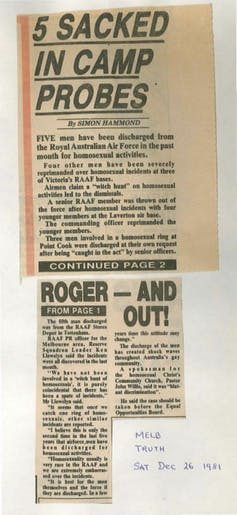In 1992 the cabinet overturned the ban on lesbians and gays serving in the Australian Defence Force and has gradually embracing LGBTI military service.
On Anzac Day 1982, a group of five men went to Melbourne’s Shrine of Remembrance to lay a wreath. As they climbed the steps, Victorian RSL President Bruce Ruxton reportedly called out “Stop those men!” and, together with the Shrine guard and the Shrine commissionaire, blocked the group from laying their wreath.
After a short confrontation, the police shepherded the men away. Even though this was the time of day when the public was allowed to lay wreaths, these men – ex-servicemen at that – were turned away because they were gay.
They were the Gay Ex-Services Association (GESA). The group was apolitical and the card accompanying their wreath simply read: “For all our brothers and sisters who died during the wars. Gay-Ex Services Association.”
Other members of GESA again tried to lay wreaths on Anzac Day in 1983 and 1984; though Shrine officials and Ruxton did try to obstruct them again, they were able to lay their wreaths. But GESA disbanded shortly thereafter and, as far as we know, there were no further attempts on Anzac Day to lay wreaths to commemorate lesbian, gay, bisexual, transgender or intersex (LGBTI) military service.
That is all about to change.
Joining in this year’s commemorations
This Anzac Day, representatives of the Defence Gay, Lesbian, Bisexual, Transgender and Intersex Information Service (DEFGLIS) will be laying a wreath at the Shrine in Melbourne with a former GESA member, at last righting a wrong after more than 30 years. DEFGLIS members will also lay wreaths at Martin Place in Sydney, the Australian War Memorial in Canberra and in Townsville.
DEFGLIS is a non-political organisation that both supports and represents lesbian, gay, bisexual, transgender and intersex personnel and their families. Whereas in 1982 GESA was a small group of fewer than 10 based only in Melbourne, DEFGLIS is a national organisation with more than 400 members, including current and former members of the Navy, Army and Air Force, as well as civilian Defence employees, family members and other allies. Its mere existence is a testament to the vast changes to the Australian Defence Force (ADF) in the past 30 years.
Back when GESA was around, homosexual acts were still illegal in most states and being gay or lesbian contradicted ADF regulations. But of course lesbians and gay men were serving in the ADF, as they had throughout the 20th century.
Historians have found evidence of gay men serving in the first world war, with records of soldiers being convicted for “buggery” or tabloids reporting gay soldiers roaming the city streets. In the second world war, there were reports from Papua New Guinea of soldiers forming relationships that were sometimes even tolerated by their commanding officers.

From the second world war onwards there were lesbians in the women’s services, notwithstanding training that explicitly warned servicewomen against such behaviour.
When gay or lesbian service members were found out – sometimes as the result of witch-hunts – they faced the choice of ceremoniously being stripped of their rank and badges or of quietly resigning from the ADF. Most requested the latter.
In the 1980s, there were occasional debates in the Commonwealth Parliament over permitting gays and lesbians to serve in the ADF. Then, in late 1990, a dismissed lesbian from the Navy challenged the policy in the Human Rights and Equal Opportunities Commission, putting the issue on the political agenda.
Throughout 1992, the Keating Labor government deliberated the ban on gay and lesbian service. The government was divided, but in November 1992, the cabinet overturned the ban on lesbians and gays serving in the ADF. This was 19 years before the United States would permit gays and lesbians to serve openly after repealing its infamous “don’t ask, don’t tell” policy.
Beyond tolerance
Since repealing the ban in 1992, both the Commonwealth government and the ADF have gradually shifted from tolerating to embracing LGBTI military service. In 2005, family benefits were extended to same-sex partners of Defence members. In 2010, Defence repealed the ban on transgender personnel. Defence now targets LGBTI recruitment as part of its diversity and inclusion strategy.
In 2013, the Australian Army issued rainbow lapel pins and cufflinks that soldiers may wear during the week of Sydney’s Gay and Lesbian Mardi Gras. Defence members have marched in Mardi Gras on and off since 1996, and since 2013 the ADF has authorised them to march in uniform.
At this year’s Mardi Gras, the three most senior enlisted members of the ADF volunteered to lead the Defence contingent – yet another sign of the ADF embracing diversity amongst its members.
Of course there are still problems of homophobia and transphobia within the ADF, but the progress over the last 33 years has been remarkable, and it can only get better.
On this Anzac Day, Australians will all pause to honour a century of military service since the landing at Gallipoli. That century of service includes gay, lesbian, bisexual, transgender and intersex personnel who put their lives on the line for this country, often not being able to enjoy the very freedoms they were fighting for.
At last, their hidden contributions and sacrifices are able to be remembered, alongside all others who were once shamefully left out of our national commemorations.
Noah Riseman, Senior Lecturer in History, Australian Catholic University
This article is republished from The Conversation under a Creative Commons license. Read the original article.
![]()
